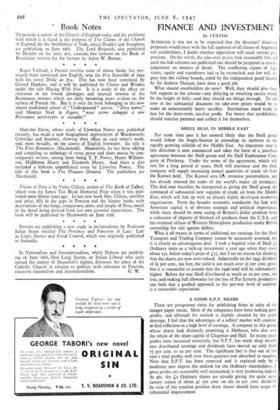FINANCE AND INVESTMENT By CUSTOS
ALTHOUGH it was not to be expected that the directors' share-out proposals would meet with the full approval of all classes of Argentine rail stockholders, I doubt whether opposition will reach serious pro. portions. On the whole, the take-over prices look reasonably fair, and until the full schemes are published one should be prepared to reserve judgement on matters of detail. The conflicting claims of legal status, equity and expediency had to be reconciled, and few will dis- pute that the railway boards, aided by the independent panel headed by Sir Andrew Duncan, have done a good job. What should stockholders do now? Well, they should give their full support to the scheme—any delaying or wrecking tactics would be the height of folly—and they should see things through. To sell now at the substantial discounts on take-over prices would be to make an unnecessarily heavy sacrifice. Institutions stand ready to buy for the short-term, tax-free profit. Far better that stockholders should exercise patience and collect it for themselves.
SHELL DEAL IN MIDDLE EAST
For some time past it has seemed likely that the Shell group would follow the Anglo-Iranian in extending its interests in the rapidly growing oilfields of the Middle East. An important step in this direction is now announced and takes the form of a purchase agreement between the Shell group and the Gulf Exploration Corn- pany of Pittsburg. Under the terms of the agreement, which will run for a long period of years, Shell will purchase and the Gulf company will supply increasing annual quantities of crude oil from the Kuwait field. The Kuwait area hts immense potentialities, and has already entered the ranks of the world's major oil producers. The deal may therefore be interpreted as giving the Shell group the command of substantial new supplies of crude oil from the Middle East, which will link up with an already highly developed marketing organisation. From the broader economic standpoint the link with American capital is of obvious strategic and political importance, while there should be some easing of Britain's dollar problem from a reduction of-imports of finished oil products ,from the U.S.A. and the eventual release of Western Hemisphere production under British ownership for sale against dollars. What it all means in terms of additional net earnings for the Shell Transport and Trading Company cannot be accurately assessed, but it is clearly an advantageous deal. I took a hopeful view of Shell Li Ordinary units as a lock-up investment a year ago when they stood about 15s. below today's price of L51, but I see no reason for thinking that the shares are now over-valued. Achalittedly on the 1945 dividend of per cent., tax free, the yield is not much over 21 per cent. gross. but it is reasonable to assume that the 1946 total will be substantially higher. Before the war Shell distributed as much as 20 per cent., tax free, and making full allowance for the loss of Far Eastern production one feels that a gradual approach to the pre-war level of earnings is a reasonable expectation.
A GOOD E.P.T. SHARE
These are prosperous times for publishing firms in spite of the meagre paper ration. Most of the companies have been making good profits, and although the outlook is slightly clouded by the papei shortage, I feel that the advantages of a sellers' market will continue te find reflection in a high level of earnings. A company in this group whose shares look distinctly promising is Methuen, who also own the whole of the share capital of Chapman and Hall. In recent years profits have increased materially, but E.P.T. has made deep inroads into distributed earnings and dividends have moved up only from 71 per cent. to Io per cent. The significant fact is that out of last year's total profits well over three-quarters was absorbed in taxation. Now that E.P.T. has been removed and is replaced only by 3 moderate new impost the outlook for the Ordinary shareholders, II gross profits are reasonably well maintained, is very promising indeed. At 46s. the Li Ordinary shares are already giving the quite satis- factory return of about 44 per cent, on the 10 per cent. dividend In view of the taxation position these shares should have scope foi substantial improvement


































 Previous page
Previous page